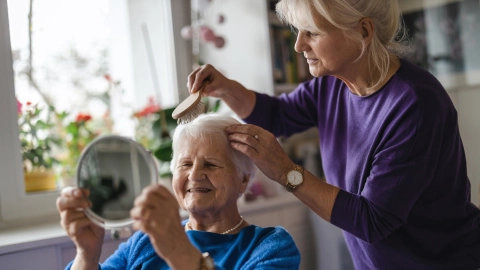Care Palliative care for children
When children and adolescents have a critical or terminal illness, the entire family needs support. Palliative care therefore includes the family as a whole. At the heart of palliative care is the goal of maintaining quality of life.
At a glance
- Special palliative care services are available for children and adolescents with critical or terminal illnesses.
- They aim to maintain the best possible quality of life for the children. The family as a whole is included and supported.
- Palliative care can be provided at home, in hospital or in a hospice.
- Pediatricians play a particularly important role in primary palliative care.
- If the patient has special care requirements, interdisciplinary palliative teams can take responsibility for outpatient care.
- Hospice services are part of the palliative team and also offer support and respite.

How can quality care be provided to critically ill children and adolescents?
Around 50,000 children, adolescents and young adults are living with a critical or terminal illness in Germany. These illnesses include profound and multiple learning disabilities, cancer and incurable diseases of the muscular and nervous system.
They and their families often have specific needs that require a special type of palliative care. This may include psychological and social support for parents and siblings, specific support, pain management, symptom control, hospital or hospice care and much more – depending on the child’s age and stage of development.
Palliative care for children and adolescents differs from palliative care for adults in a number of key ways. While palliative care for adults usually focuses on the final stage of life, children often receive palliative care on a repeat or continuous basis over several years from the point of diagnosis onwards. Generally speaking, children also tend to have different conditions to adults and therefore require a different type of palliative care.
The term “palliative” means that an illness or disability cannot be treated for the purpose of curing it. Instead, treatment measures are aimed at alleviating patient suffering and the effects of their illness. Palliative care includes medical, nursing, psychological, social and pastoral care.
Professionals use the term “pediatric palliative care” when talking about palliative care for children and adolescents. Treatment is tailored to meet the individual needs of each patient and their family.
How is palliative care for young people organized?
In Germany, there are specialized organizations and facilities dedicated to providing palliative care to children and adolescents. These include pediatric hospitals and outpatient services.
The family as a whole is included and supported by palliative care. The aim is to maintain the best possible quality of life for the young person. Pediatric palliative care services also provide support to the family following the death of the child.
What types of palliative care are available?
Palliative care can be provided at home or in a facility – depending on how advanced the illness is, the symptoms it causes and how effectively these can be alleviated in a home setting, supported by professional services.
The cost of palliative care is covered by statutory health insurance funds. People with private health insurance can ask their insurance provider about the cover they offer in this area.
It is possible to apply for a care grade as soon as the illness begins to limit the patient’s independence or their cognitive, psychological and physical abilities. Social care insurance benefits are the same for people with statutory or private health insurance.
Depending on their current state of health, children and adolescents with critical and terminal illnesses may need:
- primary palliative care
- general outpatient palliative care or GOPC (“AAPV” in German)
- specialized outpatient palliative care or SOPC (“SAPV” in German)
- inpatient care in a hospital
- hospice care
Those in employment can obtain full-time or part-time leave from work for up to three months to accompany a family member with an incurable illness in the final stage of life. They can apply for caregiver leave and for an interest-free loan. A care grade is not required in this case.
More information about the requirements for caregiver leave is available from the Federal Ministry of Family Affairs (Bundesfamilienministerium).
Information about palliative care for children and adolescents with private health insurance is available from the Association of Private Health Insurers (Verband der Privaten Krankenversicherung e.V.).
What options are available for outpatient palliative care at home?
If a child is being cared for at home, their pediatrician is initially responsible for providing them with primary palliative care in cooperation with outpatient (pediatric) palliative care services. Primary palliative care incorporates medical care, as well as control of drug therapy, relief of pain, breathing difficulties and any other symptoms and psychosocial support.
What is general outpatient palliative care (GOPC)?
If the patient’s condition deteriorates and intensive medical care is needed, young patients are entitled to general outpatient palliative care (GOPC). This type of care is also primarily provided by pediatricians. If necessary, they can also make house calls and can be contacted by phone outside of visiting hours. Pediatricians are supported by (pediatric) care services and experts in social pediatric centers.
A social pediatric center (SPC) is a specialized facility dedicated to the outpatient care of children and adolescents with physical and intellectual disabilities and chronic illnesses. Such centers enable interdisciplinary cooperation between doctors, therapists, educators and social workers to ensure holistic treatment and support for the children affected and for their families.
A list of social pediatric centers in Germany is available on the website of the German Society for Social Paediatrics and Youth Medicine (Deutsche Gesellschaft für Sozialpädiatrie und Jugendmedizin e.V.).
What is specialized outpatient palliative care (SOPC)?
If the patient's condition further declines to the extent that the palliative care provided up to this point is no longer sufficient, people with statutory health insurance are entitled to specialized outpatient palliative care (SOPC). For those with private insurance, the entitlement depends on the terms and conditions agreed with the insurance provider.
SOPC for children and adolescents is normally provided by a pediatric palliative team. The team comprises pediatricians with an additional qualification in palliative medicine and pediatric nurses with an additional qualification in pediatric palliative care. If necessary, the team may be joined by professionals from the areas of social work, psychology and pastoral care.
The team is based in a children's hospital or children’s hospice. Under certain conditions, the team may also visit the patient’s home. SOPC must be prescribed and must be approved by the health insurance fund.
SOPC includes the following services:
- advice
- coordination of care providers
- additional supportive care
- holistic care
What support is available from outpatient hospice services?
Outpatient hospice services support children and adolescents with incurable illnesses and their loved ones. Volunteers visit the home on a regular basis, are available to talk and help the family manage its daily routines.
Another important service provided by outpatient hospice services is to offer respite to the family. They can attend appointments with the patient or take charge of their care on a short-term basis. This allows parents and siblings to take some time for themselves and recharge their batteries. Outpatient hospice services are free of charge.
How is palliative care in hospital organized?
If palliative care cannot be provided at home – for example, due to sudden complications – the patient is admitted to hospital.
They may then receive care in specialist hospital departments or in the intensive care ward of a pediatric hospital near their home. Very few hospitals have special palliative wards or units for children. However, almost all hospitals have a palliative team.
Palliative teams work with other specially trained healthcare professionals to ensure that the child’s pain, as well as other symptoms such as weakness or breathing difficulties can be alleviated as far as possible. The team can also provide support when planning for the child receive care at home or in a care facility following discharge from hospital.
Psychosocial support is another core component of palliative care in hospital. The team can provide the child with support in many different ways – such as processing emotions, communicating with their family and preparing to die.
When is hospice care considered?
Pediatric hospices support children and adolescents and their families for longer periods following a diagnosis. Unlike hospices for adults, they are not specifically designed for the final stages of life. Instead, they are places where young people and their families can rely on loving and professional support to help them through times of crisis or provide them with some time away from stressful daily routines.
Pediatric hospices offer a range of services. In addition to nursing and medical care, these include psychological support, music and art therapy, family counseling and other activities tailored to the needs and interests of the child and their family.
Hospice staff also offer support during the final stage of the child’s life, as they die and as the family grieve. Special supports for siblings are also provided.
Partial residential care in a hospice is also possible – this is known as a day hospice. Critically ill children may be cared for in a day hospice one or more days each week.
What are the criteria for admission to a hospice?
Staying in a hospice is free of charge for children with an incurable and terminal illness and their families. 95 percent of costs are covered by statutory health insurance funds and long-term care insurance funds. The hospice uses donated funds to cover the remaining costs. People with private health insurance should ask their provider whether the costs of hospice care are covered.
For statutory health insurance funds to cover the costs of outpatient psychotherapy, the following conditions must be met:
- The patient does not require or does not want hospital treatment.
- Outpatient care is not possible, for example, because the nursing, medical and psychosocial requirements are beyond the capacity of those caring for the patient.
- The patient is no older than 27 years of age.
If these conditions are met, the pediatrician issues the confirmation that is required for admission to a hospice. This certificate must be submitted to the patient's statutory health insurance fund together with the application for cost coverage. Application forms are available from hospice services, hospice service websites and statutory health insurance funds, for example. The hospice can provide help with completing an application.
Pediatric palliative care – what support and advice are available?
Family doctors, health insurance providers and local non-profit organizations provide advice and support in relation to palliative care. Statutory health insurance funds are obliged to provide their members with an overview of contact details for advice and support centers in the region.
There are also various self-help organizations and associations that provide critically and terminally ill children and their families with support, advice and opportunities to exchange information and experiences.
You can search for suitable self-help supports via the National Contact and Information Point for Encouraging and Supporting Self-Help Groups (Nationale Kontakt- und Informationsstelle zur Anregung und Unterstützung von Selbsthilfegruppen, NAKOS).
Inpatient support
In some cases, short-term care in an inpatient care facility may be required. This applies to children with a care grade 2 or higher. Unlike children’s hospices, these facilities do not normally allow parents and siblings to stay with the child.
Special group homes are available for adolescents and young adults who rely on continuous intensive care due to their illness. It is possible to stay in these facilities on a permanent basis.
Contact details for palliative care providers
The hospice and palliative care information portal (“Wegweiser Hospiz- und Palliativversorgung”) operated by the German Association for Palliative Medicine contains the contact details for hospices, palliative doctors and palliative teams for children and adolescents.
You will find the addresses of inpatient and outpatient hospices on the website of the German Association of Children’s Hospices (Bundesverband Kinderhospiz).
Social advice centers
Families with critically ill children can avail of a range of social services and benefits. However, it can sometimes be difficult to find out how to access them. It is recommended that you contact a social advice center as soon as possible. Advice on social services and benefits is available, for example, from social associations, self-help organizations and welfare associations.
Families of care recipients can seek advice on the topic of palliative care from a care advice center, such as a care support point, for example.
You will find the contact details for care support points in the database of the Center for Quality in Care (Zentrum für Qualität in der Pflege, ZQP).
In addition, the Independent Patient Advice Service for Germany (Unabhängige Patientenberatung Deutschland, UPD) offers free advice on benefits and legal issues. All relevant contact details are available on the UPD information portal.
Complementary independent participation counseling (“ergänzende unabhängige Teilhabeberatung”, EUTB) provides advice to people with disabilities and chronic illnesses. You will find centers offers counseling near you on the portal of the Fachstelle Teilhabeberatung agency for participation counseling.
- Ansprechstelle im Land Nordrhein-Westfalen zur Palliativversorgung, Hospizarbeit und Angehörigenbegleitung (ALPHA) im Landesteil Westfalen-Lippe, Münster in Zusammenarbeit mit den SAPV-Teams für Kinder, Jugendliche und junge Erwachsene in Westfalen-Lippe. Palliativ- und Hospizversorgung für Kinder, Jugendliche und junge Erwachsene in Westfalen-Lippe. Eine Informationsbroschüre für Versorger. Stand: 2018.
- Bundesministerium der Justiz. Sozialgesetzbuch (SGB), Fünftes Buch (V) - Gesetzliche Krankenversicherung. Stand: 16.09.2022.
- Bundesministerium für Gesundheit. Hospiz. Aufgerufen am 23.02.2023.
- Bundesverband Kinderhospiz e.V. Kinderhospizarbeit. Aufgerufen am 23.02.2023.
- Deutscher Hospiz- und Palliativverband e.V. Palliative Care. Aufgerufen am 23.02.2023.
- Gemeinsamer Bundesausschuss (G-BA). Spezialisierte ambulante Palliativversorgung. Aufgerufen am 23.02.2023.
- Kassenärztliche Bundesvereinigung. Palliativversorgung. Möglichkeiten der ambulanten Versorgung, Praxisbeispiele und rechtliche Hinweise. Aufgerufen am 23.02.2023.
- Schäfer-Kuczynski J. Sterbebegleitung von Kindern und Jugendlichen: Zwischen Leistungsanspruch und Rechtswirklichkeit. Kritische Vierteljahresschrift für Gesetzgebung und Rechtswissenschaft, 99(4), 321–333. 2016.
- Zernikow, Boris: Palliativversorgung von Kindern, Jugendlichen und jungen Erwachsenen. Berlin Heidelberg New York: Springer-Verlag, 2013.
Reviewed by the Hesse consumer advice centers (Verbraucherzentrale Hessen e.V. – VZ HE)
As at:





